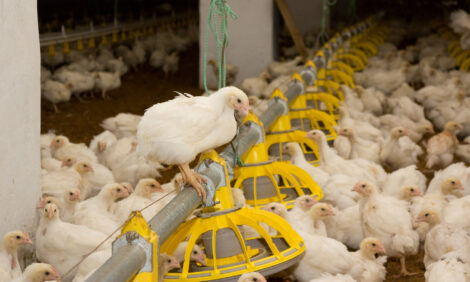



Guangdong Province's Poultry Industry Hit Hard by H7N9
CHINA - The H7N9 bird flu outbreak in eastern and northern parts of China has seriously affected the poultry business in Guangdong province over the past weeks.Prices for chickens, ducks, geese, doves, quail and other domestic poultry have plummeted in many cities in the southern province that is known for its boiled sliced chicken and other chicken dishes.
In Foshan, about 20 kilometers from Guangzhou, the provincial capital, prices for live poultry have fallen by about 50 per cent since 7 April.
In the city's wholesale markets, a kilo of live chickens has fallen to 4.6 yuan (74 cents) from 10.6 yuan in previous months, according to the Foshan bureau of agriculture.
Compared with previous months, the price of duck fell to 5.4 yuan (from 9.4 yuan) and goose to 11.6 yuan (from 14.4 yuan) a kilo.
"Despite the lower prices, few poultry traders want to buy poultry in the city's wholesale markets because of the slow sales in local agricultural markets," said a senior executive from Fuzhuang Chicken Farm in Foshan.
"Now we lose from 10 to 15 yuan when each bird changes hands, and the company has accrued economic losses of more than 2 million yuan in the past week," said the executive surnamed Zeng.
Meanwhile, around 80,000 newborn chickens have to be destroyed a day because of the slow sales, he added.
At Guijiang Poultry Wholesale Market in Dali township, the largest such market in Foshan, fewer than 100,000 birds were sold on Saturday, compared with more than 150,000 a day in the first quarter of the year.
At Guangzhou's Taojin agricultural market, a poultry trader said sales at her booth fell by at least 10 per cent since Tomb Sweeping Day on 4 April.
At the Beilaide pigeon farm in Zhaoqing, more than 120,000 pigeons have been slaughtered because of slow sales in the past week.
Li Yuzhen, an executive at the farm, said they had lost more than 2 million yuan in the past week.
"We would have had to feed the pigeons more than 20 tons of feed, about 80,000 yuan a day, if we hadn't slaughtered them," she said.
In Guangzhou, workers from the bureau of animal sanitation buried 38 live and 12 dead chicks in the city's Huadu district on Saturday (13 April).
City personnel quickly arrived on the scene when residents reported that the chicks and bodies were found dumped in the district's Gongye'erlu area of the Furong Industrial Zone.
Peng Cong, director of Guangzhou office of animal sanitation, was quoted by New Express Daily on Sunday as saying that it was not yet known whether the chicks carried H7N9 virus because the testing has not been completed.
Peng said he believed the ill chicks were dumped by locals.
According to the Guangdong Center for Disease Control and Prevention, no H7N9 cases or other unknown cases of pneumonia have been reported in the province.
None of the 542 workers in Guangdong's poultry industry who were asked to take a sample test for H7N9 virus between 1 and 12 April were diagnosed as having H7N9 bird flu virus.
Only a pregnant woman was detected to have contracted H1N1 virus flu in the Guangzhou's Huadu district in the past week.








